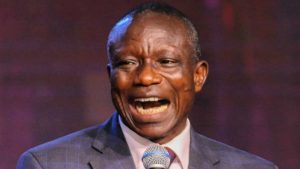PRESIDENT of the Pentecostal Fellowship of Nigeria, PFN, Bishop Francis Wale Oke, yesterday, warned the Federal Government against further aggravating the suffering of Nigerians through the proposed subsidy removal that will lead to hike in the price of petroleum.
Bishop Oke, in a statement by his Media Office, warned that the implementation of such policy could increase the hardship currently being experienced by the people of the country.
He lamented that prices of consumables and other items were increasingly becoming out of reach of the people, noting that if the proposed subsidy removal is effected, it would heighten the hardship of the people of the nation.
He said: “Everybody will feel it, particularly the less privileged. The negative effects will surely outweigh the positive. The cost of transportation for human and goods across the country will skyrocket and other things connected which will have a spiral effect on general living standard of the populace; the suffering will be multi-dimensional. Please let all stakeholders be sensitive to this avoidable path and do the needful.
“By whatever means, let the Federal Government put its heart into ensuring that our refineries are back to life. In addition, to stem the rising cost of living, farmers and others connected to them should be encouraged. This is what can help our economy.
“Without begging the issue, there should be well defined palliative measures in place that can cushion the effect of the hardship being experienced by Nigerians, especially the commoners. One is not talking about political palliatives that never last. We have seen enough of such.”
Besides, the Bishop said: “An increase in the price of petroleum from its present N165 to N340 per litre, can trigger tension and crises in the country which in turn can paralyse our economy if not handled with utmost care.”
On the proposed N5000 to about 40 million poor Nigerians, the cleric said: “Again, the planned introduction of N5,000 for 40 million poor Nigerians, is to create a cesspool of corruption. How do you define ‘the poor? They, mostly, don’t use telephones. They, mostly, don’t have bank accounts. How will the money get to them?”


